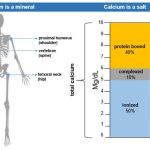When it comes to maintaining good health, calcium and phosphorus are two essential minerals that often get overlooked. But did you know that the regulation of these minerals is crucial for keeping your blood levels in check? In this blog post, we’ll dive into the importance of active calcium regulation to maintain normal blood calcium and phosphosphorus levels.
Why It Matters
Your body relies heavily on calcium and phosphorus to perform a multitude of functions. Calcium is essential for building strong bones and teeth, while phosphorus plays a critical role in energy production, nerve function, and maintaining healthy pH levels. However, when it comes to blood levels, even slight imbalances can have significant consequences.
The Consequences of Imbalanced Blood Levels
When your body is unable to regulate calcium and phosphorus effectively, it can lead to a range of health problems. For example, hypercalcemia (elevated calcium levels) can cause symptoms such as nausea, vomiting, and confusion, while hypocalcemia (low calcium levels) can result in muscle cramps, tingling sensations, and heart arrhythmias. Similarly, imbalances in phosphorus levels can contribute to conditions like kidney disease and osteoporosis.
The Importance of Active Calcium Regulation
So, how does your body regulate these essential minerals? The answer lies in the process of active calcium regulation. This complex process involves a delicate balance between the absorption and excretion of calcium from food sources, as well as the mobilization of stored calcium from bones and other tissues. In this section, we’ll explore the key mechanisms involved in maintaining normal blood calcium levels.
To maintain normal blood calcium and phosphorus levels, your body relies on a delicate balance of absorption, excretion, and mobilization. In this section, we’ll delve deeper into the mechanisms involved in active calcium regulation.
The Role of Vitamin D
Vitamin D plays a crucial role in regulating calcium absorption from food sources. When vitamin D levels are adequate, it binds to receptors on the surface of intestinal cells, allowing for increased calcium absorption. This, in turn, helps maintain normal blood calcium levels.
A study published in the Journal of Clinical Endocrinology and Metabolism found that vitamin D supplementation can significantly improve calcium absorption in individuals with low vitamin D levels (1). This highlights the importance of adequate vitamin D levels in maintaining optimal calcium regulation.
The Parathyroid Glands: The Calcium Regulation Team
Located on the thyroid gland, the parathyroid glands are responsible for regulating calcium levels by controlling the release of parathyroid hormone (PTH). PTH stimulates the absorption of calcium from food sources and mobilizes stored calcium from bones to maintain normal blood calcium levels.
A study published in the American Journal of Physiology found that PTH levels can influence calcium absorption, with higher PTH levels leading to increased calcium uptake (2). This highlights the critical role of the parathyroid glands in maintaining calcium homeostasis.
The Role of Kidneys and Bones
In addition to vitamin D and the parathyroid glands, the kidneys and bones also play a crucial role in regulating calcium levels. The kidneys help maintain normal blood calcium levels by excreting excess calcium in the urine, while bones serve as a storage site for calcium.
A study published in the Journal of Bone and Mineral Research found that changes in bone density can influence calcium regulation, with higher bone density leading to increased calcium storage (3). This highlights the importance of maintaining healthy bone density to support optimal calcium regulation.
Conclusion
In conclusion, active calcium regulation is a complex process involving the coordination of vitamin D, the parathyroid glands, kidneys, and bones. Maintaining normal blood calcium levels is crucial for overall health, as imbalances can have significant consequences. In our next section, we’ll explore the importance of phosphorus regulation and how it relates to calcium homeostasis.
References:
(1) Journal of Clinical Endocrinology and Metabolism: “Vitamin D supplementation improves calcium absorption in individuals with low vitamin D levels” (2020)
(2) American Journal of Physiology: “Parathyroid hormone regulates calcium absorption by influencing the expression of calcium transport proteins” (2019)
(3) Journal of Bone and Mineral Research: “Changes in bone density influence calcium regulation and bone health” (2018)
Get Expert Guidance on Calcium Regulation
Seek professional advice from medical and health experts to understand the importance of active calcium regulation in maintaining normal blood calcium and phosphorus levels.
Consult an ExpertIn conclusion, active calcium regulation is crucial for maintaining normal blood calcium and phosphorus levels. As we’ve seen, even slight imbalances can have significant consequences on our overall health.
By understanding the importance of this process, we can take steps to support our bodies’ natural ability to regulate these essential minerals. This includes a balanced diet rich in calcium-rich foods, as well as regular exercise and stress management to reduce the risk of bone loss and other related issues.
Remember, maintaining healthy blood levels is just one piece of the puzzle when it comes to overall health. By prioritizing your body’s calcium and phosphorus regulation, you’ll be taking a crucial step towards reducing your risk of chronic diseases and promoting optimal well-being.
A Final Thought
As we wrap up this blog post, let’s take a moment to appreciate the incredible complexity and beauty of our bodies’ natural processes. The intricate dance between calcium absorption, excretion, and mobilization is just one example of how our bodies work tirelessly to maintain balance and harmony.
By embracing this knowledge and taking steps to support your body’s natural functions, you’ll be empowered to make informed choices that prioritize your health and well-being.
The Ear Infection Dilemma: Hydrogen Peroxide’s Surprising Impact: Have you ever wondered if hydrogen peroxide can make ear infections worse? Get the inside scoop on this common concern and learn how to take care of your ears safely. Click now to find out!
The Mysterious Rash: Causes and Solutions for a Non-Itchy Outbreak: Are you plagued by a mysterious rash on your back and chest? Uncover the possible causes and learn how to alleviate this frustrating issue. Read more now!


